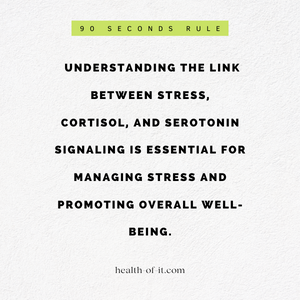Stress is an inevitable part of life, and our bodies are wired to respond to it. However, when stress becomes chronic, it can have detrimental effects on our mental and physical health. One of the ways stress affects our bodies is by releasing cortisol, a hormone that helps us cope with stress. However, cortisol can also decrease serotonin signaling, leading to mood disorders and other health problems. In this blog post, we will explore the link between psychological stress and serotonin signaling.
What is Serotonin and How Does It Affect the Brain?
Serotonin is a neurotransmitter that regulates mood, appetite, sleep, and other functions in the brain. It is often referred to as the “feel-good” hormone because it promotes feelings of happiness and well-being. Serotonin is produced in the brain and is essential for normal brain function. Low levels of serotonin have been linked to depression, anxiety, and other mental health disorders.
How Does Cortisol Affect Serotonin Signaling?
When we experience stress, our bodies release cortisol to help us cope with the stress. Cortisol prepares our bodies for a fight or flight response by increasing heart rate, blood pressure, and glucose levels. However, cortisol can also decrease serotonin signaling in the brain. Cortisol inhibits the production of tryptophan, an amino acid that is necessary for the synthesis of serotonin. This leads to decreased serotonin levels, which can result in mood disorders such as depression and anxiety.
Strategies to Boost Serotonin Levels and Reduce the Effects of Stress
There are several strategies that can help boost serotonin levels and reduce the effects of stress. These include:
- Exercise: Regular exercise has been shown to increase serotonin levels in the brain and reduce the effects of stress.
- Diet: Eating a healthy, balanced diet that includes foods rich in tryptophan, such as turkey, chicken, fish, and tofu, can help boost serotonin levels.
- Mindfulness meditation: Practicing mindfulness meditation can help reduce stress and increase serotonin levels in the brain.
Conclusion:
Psychological stress can have a significant impact on our mental and physical health. Understanding the link between stress, cortisol, and serotonin signaling is essential for managing stress and promoting overall well-being. By incorporating strategies such as exercise, a healthy diet, and mindfulness meditation, we can help boost serotonin levels and reduce the effects of stress on our bodies and minds.
